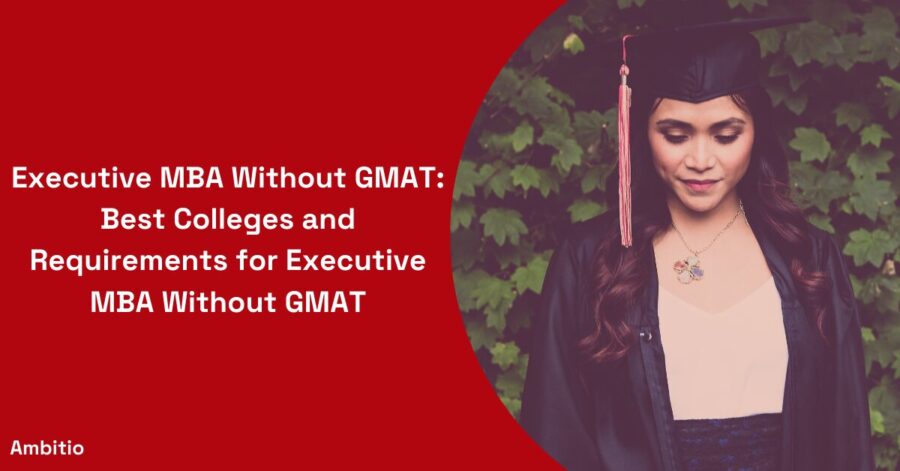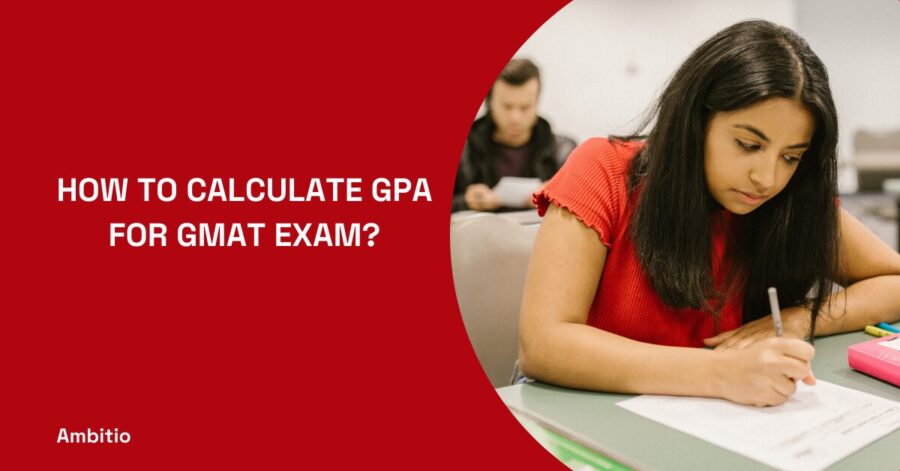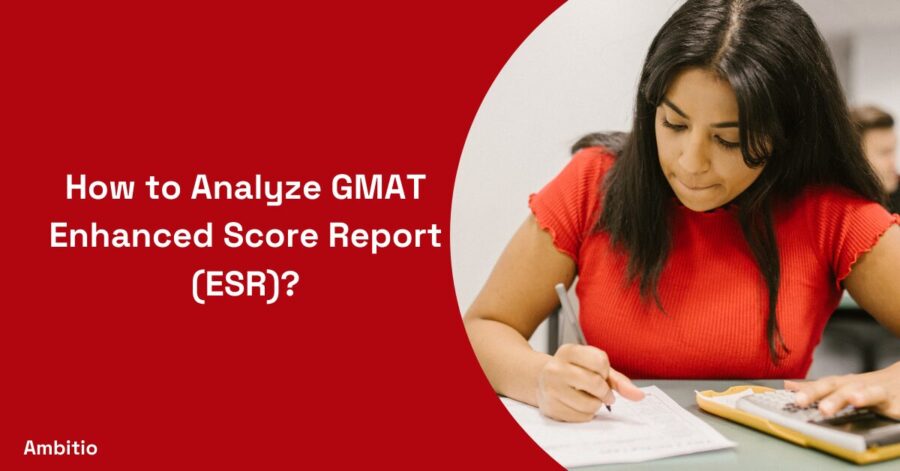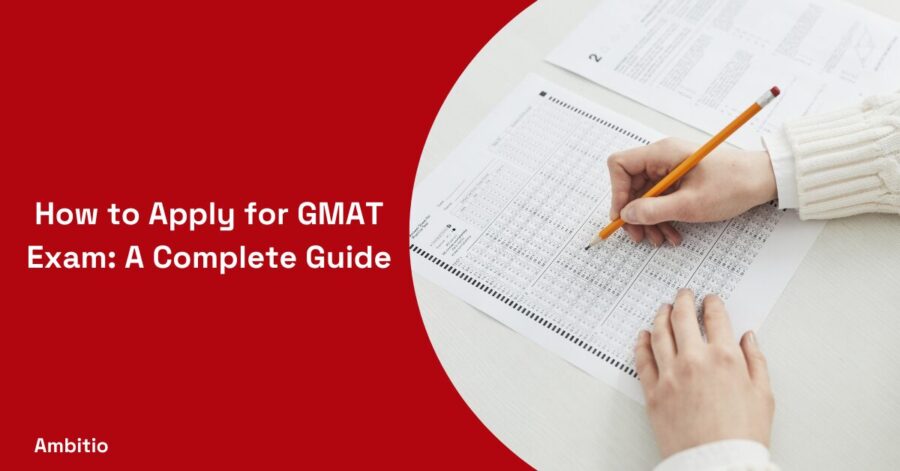11 December 2024
9 minutes read
Executive MBA Without GMAT: Best Colleges and Requirements for Executive MBA Without GMAT

Key Takeaways:
- Many top business schools offer Executive MBA programs that do not require GMAT or GRE scores, focusing instead on professional experience, leadership potential, and other personal qualities.
- The Executive Assessment (EA) is widely accepted instead of the GMAT at several institutions, offering a more feasible option for busy professionals who may not have time for extensive test preparation.
- Significant work experience, especially in leadership or managerial roles, is crucial.
- Schools value practical experience highly, often over standardized test scores, when considering candidates for their EMBA programs.
What Exactly is GMAT?
The GMAT (Graduate Management Admission Test) is a standardized test used primarily for admissions into graduate business and management programs, such as MBA programs (Master of Business Administration) .
Purpose
The GMAT is designed to assess certain analytical, writing, quantitative, verbal, and reading skills in written English that are critical for success in graduate business studies.
Format
- The test includes four main sections: Analytical Writing Assessment, Integrated Reasoning, Quantitative, and Verbal sections.
- It is typically taken on a computer, and the questions adapt in difficulty based on the test taker’s answers.
Usage
- Schools of business use GMAT scores to evaluate the potential of applicants for advanced study in business and management.
- Scores are used to compare applicants from different educational backgrounds, countries, and experiences.
Duration and Scoring
- The total test time is about 3.5 hours, including breaks.
- The GMAT score range is from 200 to 800, with scores evaluated in 10-point increments.
Executive MBA Program
An EMBA, or Executive Master of Business Administration, is a type of graduate-level business degree designed specifically for working professionals who are at a more advanced stage in their career. Here are some key features of an EMBA:
Target Audience
It is aimed at mid-career executives and senior professionals who have significant work experience, typically a decade or more, including managerial experience.
Format
The program is structured to allow students to continue working full-time while pursuing their degree.
Classes are usually held on weekends or in intensive blocks of time.
Duration
EMBA programs are generally shorter than traditional MBA programs, often lasting between 18 to 24 months.
Admission Requirements for EMBA Programs Without GMAT

It’s important to know the different factors that admissions officers use to decide who gets into Executive MBA (EMBA) programs that don’t require the GMAT. This will help you understand how ready and likely to succeed you are to do well in such a challenging academic setting.
Professional Experience
- Years of Experience: Most programs require candidates to have a significant amount of work experience, usually a minimum of 5-10 years, with leadership or managerial experience being particularly valued.
- Quality of Experience: Schools often look for evidence of career progression, leadership roles, and the ability to impact an organization.
Educational Background
- Undergraduate Degree: A bachelor’s degree from an accredited university is typically required, although the field of study may not be strictly specified.
- Academic Performance: Transcripts from previous academic institutions may be reviewed to ensure a foundation of academic ability.
Leadership and Managerial Skills
- Evidence of Leadership: Applicants should demonstrate strong leadership potential and skills through their professional roles, community involvement, or other activities.
- Managerial Experience: Having held managerial positions or having significant project management experience is often crucial.
Recommendations
Letters of Recommendation: Candidates are usually required to submit letters of recommendation from colleagues or supervisors who can vouch for their professional achievements and leadership potential.
Personal Statement or Essays
Purpose and Goals: Applicants might need to submit essays or a personal statement discussing their career goals, reasons for pursuing an EMBA, and how the program will help them achieve these goals.
Interviews
Personal Interviews: Many programs require candidates to undergo an interview process, which may include interviews with alumni, faculty, or admissions staff. This helps gauge the candidate’s interpersonal skills, professional demeanor, and suitability for the program.
Additional Assessments
- Alternative Tests: Some programs may require or accept alternative standardized tests like the Executive Assessment (EA), especially for candidates who have been out of an academic setting for a long time.
- English Proficiency: For non-native speakers, English language proficiency tests such as TOEFL or IELTS might be required, depending on the institution’s primary language of instruction.
Top Colleges Offering Executive MBA Without GMAT
There are a lot of great business schools around the world that offer Executive MBA (EMBA) programs that don’t need the GMAT to be taken. Work experience, leadership potential, and other personal qualities are often given more weight in these classes. Here is a list of some of the best schools that offer EMBA programs without a GMAT:
| Rank | University | Location | QS World Ranking 2024 | Program Name & Duration | Tuition Fees | EMBA Without GMAT Details |
|---|---|---|---|---|---|---|
| 1 | UCLA Anderson | Los Angeles, California | 15 | Executive MBA; 22 months | USD 176,490 | Optional GMAT/GRE; further quantitative evaluation may be required after application review. |
| 2 | London Business School | London, England | 4 | Executive MBA; 20 months | GBP 108,100 | GMAT or GRE might be waived for applicants showing strong analytical or quantitative skills. |
| 3 | Said Business School | Oxford, England | 1 | Executive MBA; 22 months | USD 98,590 | Exemptions from GMAT are granted to exceptionally experienced candidates. |
| 4 | MIT Sloan | Cambridge, Massachusetts | 1 | Executive MBA; 20 months | USD 192,000 | GMAT not obligatory; recommended if academic records do not adequately showcase academic skills. |
| 5 | Imperial College Business School | London, England | 6 | Executive MBA; 23 months | GBP 63,400 | GMAT not mandatory for this school of business. Consider if your academic qualifications need further demonstration of potential. |
| 6 | INSEAD | Fontainebleau, France | – | Global Executive MBA; 14-17 months | EUR 128,775 | Option to take INSEAD’s own EMBA admissions test as an alternative to the GMAT. |
| 7 | Kellogg School of Management | Evanston, Illinois | 11 | Executive MBA; 2 years | USD 111,096 | GMAT typically not required, but may be requested if transcript analysis indicates concerns. |
| 8 | Judge Business School | Cambridge, England | 6 | Cambridge Executive MBA; 20 months, Global Executive MBA; 20 months | GBP 75,800, GBP 86,600 | GMAT waiver possible at EMBA Director’s discretion based on the overall strength of the application. |
| 9 | NYU Stern | New York, United States | 38 | Executive MBA; 22 months | USD 213,100 | GMAT or GRE generally not needed, though may be considered to prove sufficient academic capability. |
| 10 | Boston University | Boston, Massachusetts | 93 | Online MBA; 22 months | USD 4,000 per module | GMAT or GRE generally optional; adequate quantitative skills required for waiver. |
How to Get an Executive MBA Abroad Without Taking the GMAT?
Gaining admission to an Executive MBA (EMBA) program abroad without the GMAT can be an excellent pathway for experienced professionals looking to expand their business acumen and global network. Here’s a guide on how to navigate this process:
1. Research Programs and GMAT Requirements
Identify Schools and Locations: Find out which countries and schools offer EMBA programs that don’t need the GMAT as a first step. Pay attention to how well the programs are ranked around the world and which specializations fit with your job goals.
Understand the Admissions Criteria: Each school has its unique set of requirements. Besides the GMAT and GRE score, consider what alternative credentials they accept, such as professional experience, other academic achievements, or alternative tests like the Executive Assessment (EA).
2. Leverage Professional Experience
Highlight Your Work Experience: Many EMBA programs value practical, managerial experience over standardized tests. Prepare to detail your leadership roles, management experience, business achievements, and how they have prepared you for advanced study.
Showcase Career Progression: Demonstrating a trajectory of increasing responsibility and impact in your professional field can strongly support your application.
3. Prepare Strong Application Materials
- Update Your CV: Ensure your CV reflects significant professional achievements, leadership experiences, and any contributions to your field.
- Craft Detailed Essays: Write compelling essays or personal statements that convey your motivation for pursuing an EMBA, your career goals, and why you choose a particular program. Highlight how an EMBA fits into your professional growth plan.
- Gather Impactful Recommendations: Obtain letters of recommendation from supervisors or colleagues who can vouch for your leadership qualities and professional accomplishments.
4. Demonstrate Academic Proficiency
Showcase Previous Education: If you have a strong academic record or advanced degrees, make sure to highlight this. A high GPA from your undergraduate or any subsequent studies can compensate for not having GMAT scores.
Consider Alternative Tests: Some programs may accept or even prefer other tests like the GRE, or specifically for executives, the Executive Assessment (EA), which is shorter and less intensive than the GMAT.
5. Develop Global Competencies
International Exposure: Having experience working in international settings or with multinational teams can be beneficial. It demonstrates your ability to navigate and succeed in a global business environment.
Language Skills: Depending on the program and location, proficiency in additional languages may be beneficial and, in some cases, necessary.
6. Engage with Admissions Officers
Informational Interviews: Engage with admissions staff through informational sessions or one-on-one meetings. This interaction can provide deeper insights into the program and allow you to articulate your fit and readiness directly.
Visit Campuses: If possible, visit the school to get a sense of the culture, meet faculty, and network with current students and alumni.
7. Evaluate Financial and Logistical Considerations
Consider Costs and ROI: Assess the tuition fees, travel costs, and other expenses against the potential return on investment. Also, consider scholarships or employer sponsorship.
Plan for Relocation or Travel: If the program requires periodic residencies abroad, plan for the logistical aspects of travel and accommodation.
8. Apply to Multiple Programs
Diversify Your Options: Apply to several programs that meet your criteria to increase your chances of acceptance. Tailor each application to reflect the specific requirements and culture of each program.
Application Tips for EMBA Programs Without GMAT

Applying to Executive MBA (EMBA) programs that don’t require the GMAT involves showcasing your professional achievements and leadership potential in a compelling manner. Here are some targeted application tips to enhance your candidacy for these programs:
1. Highlight Professional Experience and Impact
- Quantify Achievements: Use concrete data to demonstrate your impact on your organization. Include metrics such as revenue growth, cost savings, project sizes, or team expansions that you have led.
- Leadership Roles: Clearly outline your leadership experiences, including situations where you led teams, drove strategic initiatives, or managed significant projects.
2. Demonstrate Career Progression
Show Growth: Trace your career progression through promotions, increased responsibilities, and skill development. This trajectory should illustrate your readiness for advanced management challenges.
Explain Transitions: If you’ve made significant career changes, explain the rationale behind these moves and how they have prepared you for a senior leadership role.
3. Focus on Personal Development Goals
Career Goals: Be clear about your short-term and long-term career objectives and how an EMBA fits into these plans. This shows intentionality and planning in your career management.
Skills Development: Identify specific skills and knowledge you aim to gain from the EMBA program to fill gaps in your current expertise.
4. Prepare Strong Essays
Personal Stories: Use your essays to tell personal stories that highlight your leadership qualities, resilience, and ability to overcome challenges.
Tailor Your Message: Customize your essays for each program, reflecting your knowledge of and fit for the specific culture, curriculum, and strengths of the school.
5. Secure Strategic Recommendations
Choose Wisely: Select recommenders who know you well and can speak specifically about your qualifications for an EMBA. Ideal recommenders are those who have directly supervised your work or have collaborated closely with you.
Guidance for Recommenders: Provide them with a brief of what the program is looking for and discuss specific instances they might highlight that demonstrate your leadership and problem-solving capabilities.
6. Showcase Additional Qualifications
Professional Certifications: Include any relevant professional certifications (e.g., PMP, Six Sigma, CPA) that add to your profile’s strength.
Academic Achievements: If you have a strong academic background or other qualifications like a master’s degree or Ph.D., make sure to highlight these as they can compensate for the absence of a GMAT score.
7. Prepare for Interviews
Mock Interviews: Practice with mock interviews specifically tailored for EMBA admissions. Focus on articulating your experience, leadership style, and why you’re pursuing an EMBA at this point in your career.
Be Concise and Clear: Develop clear and concise answers to common interview questions that communicate your strengths and vision effectively.
8. Understand and Articulate Program Fit
Research Thoroughly: Demonstrate a deep understanding of how the program’s specific features (e.g., the curriculum, faculty, networking opportunities) align with your career goals.
Conclusion
Professionals who want to improve their management and leadership skills can get an Executive MBA (EMBA) without having to take the GMAT or GRE. Top business schools globally recognize the value of significant professional experience and leadership potential, often favoring these over standardized test scores.
Applicants can enhance their candidacy through meticulous presentation of their work history, professional achievements, and clear articulation of their career goals. Programs such as the Executive Assessment provide viable alternatives to traditional tests, catering specifically to the needs of busy executives. By focusing on creating a compelling application that showcases career progression, leadership skills, and a strong professional network, candidates can secure their place in prestigious EMBA programs, thus paving the way for further career advancement and personal growth in the global business landscape.
Step into the realm of the elite professionals by joining Ambitio Pro. This premier platform is designed to elevate your career through advanced resources, expert guidance, and access to exclusive opportunities, setting you on a path to achieve unparalleled success in your field.
FAQs
Can I apply to a top MBA program without a GMAT exam score?
Yes, some management program, especially Executive MBAs, may not require a GMAT test score if candidates demonstrate significant professional experience, advanced degrees, or hold substantial managerial roles. Each program has its own criteria, so it’s essential to check the specific application process requirements of the top MBA program you’re interested in.
If an MBA program does not require a GMAT or GRE score, what other criteria are considered important during the application process?
If an MBA program does not require you to submit a GMAT or GRE score, admissions committees typically place a stronger emphasis on other aspects of your application. This includes years of work experience, professional achievements, leadership roles, academic performance, and personal interviews. These factors help the committee gauge your readiness and potential for success in the MBA program.
What alternatives are accepted instead of the GMAT at top business schools for Executive MBA programs?
At top business schools, the Executive Assessment (EA) test is increasingly being accepted instead of the GMAT for Executive MBA (EMBA) admissions. Designed specifically for executive applicants, the EA test assesses skills that are critical for the executive environment and requires less preparation time, making it suitable for busy professionals.
Many graduate programs, especially EMBAs, may also consider significant managerial experience and advanced academic qualifications as valid credentials accepted instead of the GMAT. This approach recognizes the value of practical leadership experience and previous academic success over standardized test scores, aligning more closely with the needs of experienced executives.
What are the requirements for Executive MBA programs at top business schools that do not require a GMAT score?
Executive MBA programs at top business schools that do not require a GMAT score typically emphasize alternative qualifications to assess candidates. These programs often look for substantial years of work experience, particularly in leadership or managerial roles, as a primary criterion. Prospective students must demonstrate their ability to handle complex business challenges, leadership potential, and readiness for senior management roles.
Some schools might offer a weekend MBA format that certifies working professionals by holding classes on weekends. Furthermore, strong professional recommendations, a rigorous interview process, and a compelling personal statement are critical components of the application. These elements allow admissions committees to holistically evaluate an applicant’s suitability for the rigors of an executive-level business program.

You can study at top universities worldwide!
Get expert tips and tricks to get into top universities with a free expert session.
Book Your Free 30-Minute Session Now! Book a call now




























